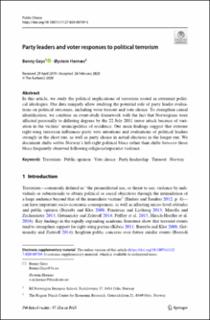| dc.contributor.author | Geys, Benny | |
| dc.contributor.author | Hernæs, Øystein Marianssønn | |
| dc.date.accessioned | 2021-06-29T10:57:00Z | |
| dc.date.available | 2021-06-29T10:57:00Z | |
| dc.date.created | 2020-04-30T14:03:49Z | |
| dc.date.issued | 2020 | |
| dc.identifier.citation | Public Choice 2020 | en_US |
| dc.identifier.issn | 0048-5829 | |
| dc.identifier.uri | https://hdl.handle.net/11250/2762290 | |
| dc.description.abstract | In this article, we study the political implications of terrorism rooted in extremist political ideologies. Our data uniquely allow studying the potential role of party leader evaluations on political outcomes, including voter turnout and vote choice. To strengthen causal identification, we combine an event-study framework with the fact that Norwegians were affected personally to differing degrees by the 22 July 2011 terror attack because of variation in the victims’ municipalities of residence. Our main findings suggest that extreme right-wing terrorism influences party vote intentions and evaluations of political leaders strongly in the short run, as well as party choice in actual elections in the longer run. We document shifts within Norway’s left-right political blocs rather than shifts between those blocs frequently observed following religious/separatist violence. | en_US |
| dc.language.iso | eng | en_US |
| dc.publisher | Springer | en_US |
| dc.rights | Navngivelse 4.0 Internasjonal | * |
| dc.rights.uri | http://creativecommons.org/licenses/by/4.0/deed.no | * |
| dc.title | Party leaders and voter responses to political terrorism | en_US |
| dc.type | Journal article | en_US |
| dc.type | Peer reviewed | en_US |
| dc.description.version | publishedVersion | en_US |
| dc.source.journal | Public Choice | en_US |
| dc.identifier.doi | 10.1007/s11127-020-00789-3 | |
| dc.identifier.cristin | 1808883 | |
| cristin.ispublished | false | |
| cristin.fulltext | postprint | |
| cristin.qualitycode | 1 | |

